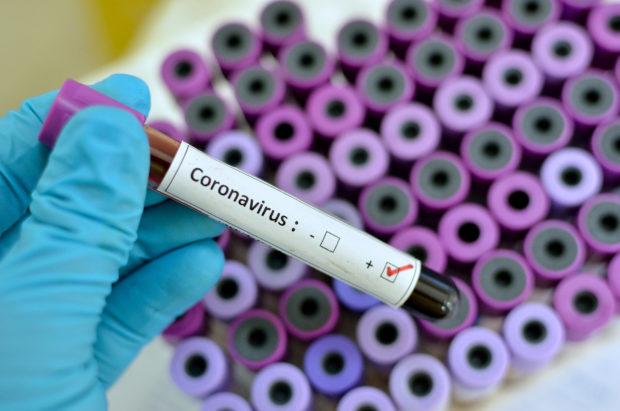EXPLAINER: Biosafety protocols for labs testing COVID-19 specimens

INQUIRER.net STOCK IMAGE
MANILA, Philippines — As the number of cases of coronavirus disease (COVID-19) continue to increase in the country, the Philippine government imposed strict measures such as an enhanced community quarantine in Luzon to reduce the risk of human-to-human transmission.
Currently, COVID-19, which is caused by Severe Acute Respiratory Syndrome-Corona Virus-2 (SARS-COV-2), infected more than 700 people in the country while the death toll due to the disease was at 45.
In the Philippines, the Research Institute of Tropical Medicine (RITM) in Muntinlupa City was initially the first laboratory that was able to test samples to confirm cases of the respiratory disease.
To date, the Department of Health (DOH) said four more subnational laboratories namely San Lazaro Hospital in Manila, Baguio General Hospital, Vicente Sotto Medical Center in Cebu and Southern Philippines Medical Center in Davao City are also able to test specimens.
Meanwhile, the Marikina local government also planned to roll out a testing center that would also accommodate testing of patients from other local government units including Pasig City and Rizal.
Article continues after this advertisementBut the DOH disapproved this laboratory center in Marikina as it should be located at a new building or facility to have the capacity for testing.
Article continues after this advertisementMarikina Mayor Marcelino Teodoro said they plan to put up the laboratory testing center at the city health office’s sixth floor, which was already vacated by all offices.
RITM director Dr. Celia Carlos said they are grateful to those who want to set up their own testing centers but stressed that laboratories must follow strict biosafety protocols.
“However, in as much as we want to accelerate this effort, we should remain meticulous in observing good laboratory practices and biosafety protocols recommended by the World Health Organization (WHO). Not all laboratories can be COVID-19 testing centers,” Carlos said in a statement on Thursday.
Carlos also said handling COVID-19 samples is done in laboratories with complex procedures.
“It is not as simple as a fingerprick examination or a self-administered pregnancy test. Each sample goes through multiple testing phases by detecting DNA/RNA of specific viruses, bacteria, or other pathogens,” the RITM chief said.
According to RITM Biorisk Management Office, establishing facilities for testing of samples must follow requirements for engineering, administrative, practices and personal protective equipment to reduce the risk of exposure of the coronavirus disease.
Engineering, facility
The standard for laboratories must comply with protocols from handling airflow to restricted entry to the laboratory, RITM said.
First, the laboratory should be a biosafety level 2 which has three rooms namely, pre-polymerase chain reaction (PCR) room for inactivation and extraction of the samples, reagent preparation room which is for using the COVID-19 test kits and the PCR rooms where the real-time PCR machines are stored.
RITM stressed that the rooms will ensure a contamination-free space as PCR procedure is prone to contamination.
The laboratory, which should be well-lighted with adequate space, must have an efficient sink with clean water supply for hand washing near the exit door and an emergency eyewash inside the laboratory.
The laboratory should have an autoclave, which is a machine that employs steam to disinfect wastes, and other tools for decontamination.
A biosafety cabinet (BSC) should be in place in laboratories as it is used to “provide effective primary containment for work with infectious materials.”
Such cabinets should be located away from “areas where movements that affects airflow pattern could disrupt the fragile air curtain at the front of the cabinet.”
For air handling, the laboratory should maintain an inward directional airflow which means the “air must flow from an area of lower contamination to an area of higher contamination.”
Lastly, access to the laboratory must be exclusive for laboratory personnel and support service providers.
“Laboratory must at least have door and lock / key. There must be a system to monitor and record transaction within the facility,” the RITM said.
Needed personnel
To perform the testing process, a staff member should be a graduate of a four-year science courses such as medical technology, biology, biotechnology and molecular biology.
The personnel should be trained on PCR testing and biosafety practices for handling of viruses and bacteria.
In-house biomedical engineers should also help in maintenance activities for machines used in testing.
Engineers must also be capable of handling biomedical equipment to support PCR laboratory operations.
All personnel working in the laboratory must also be equipped with personal protective equipment to protect them from the transmission of the disease.
The full guidelines for laboratories handling COVID-19 cases are found here.
Edited by JPV
For more news about the novel coronavirus click here.
What you need to know about Coronavirus.
For more information on COVID-19, call the DOH Hotline: (02) 86517800 local 1149/1150.
The Inquirer Foundation supports our healthcare frontliners and is still accepting cash donations to be deposited at Banco de Oro (BDO) current account #007960018860 or donate through PayMaya using this link.